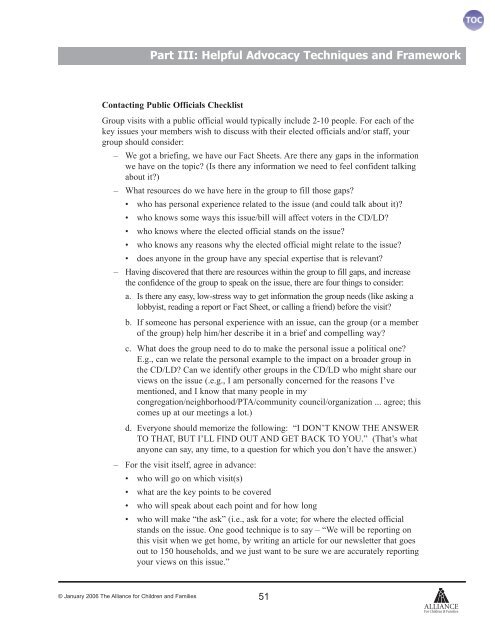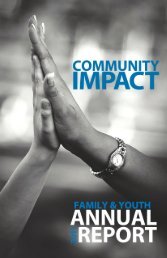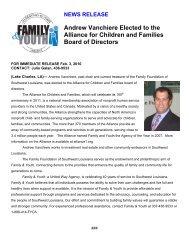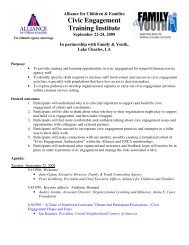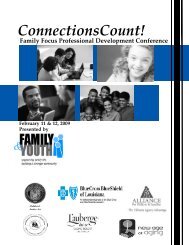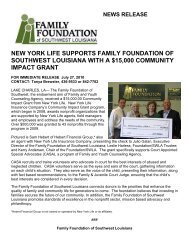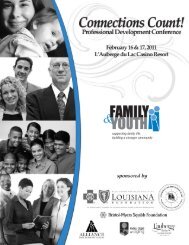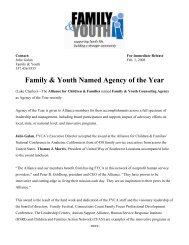Mission-based Advocacy Toolkit from Alliance for Children & Families
Mission-based Advocacy Toolkit from Alliance for Children & Families
Mission-based Advocacy Toolkit from Alliance for Children & Families
Create successful ePaper yourself
Turn your PDF publications into a flip-book with our unique Google optimized e-Paper software.
Part III: Helpful <strong>Advocacy</strong> Techniques and Framework<br />
Contacting Public Officials Checklist<br />
Group visits with a public official would typically include 2-10 people. For each of the<br />
key issues your members wish to discuss with their elected officials and/or staff, your<br />
group should consider:<br />
– We got a briefing, we have our Fact Sheets. Are there any gaps in the in<strong>for</strong>mation<br />
we have on the topic? (Is there any in<strong>for</strong>mation we need to feel confident talking<br />
about it?)<br />
– What resources do we have here in the group to fill those gaps?<br />
• who has personal experience related to the issue (and could talk about it)?<br />
• who knows some ways this issue/bill will affect voters in the CD/LD?<br />
• who knows where the elected official stands on the issue?<br />
• who knows any reasons why the elected official might relate to the issue?<br />
• does anyone in the group have any special expertise that is relevant?<br />
– Having discovered that there are resources within the group to fill gaps, and increase<br />
the confidence of the group to speak on the issue, there are four things to consider:<br />
a. Is there any easy, low-stress way to get in<strong>for</strong>mation the group needs (like asking a<br />
lobbyist, reading a report or Fact Sheet, or calling a friend) be<strong>for</strong>e the visit?<br />
b. If someone has personal experience with an issue, can the group (or a member<br />
of the group) help him/her describe it in a brief and compelling way?<br />
c. What does the group need to do to make the personal issue a political one?<br />
E.g., can we relate the personal example to the impact on a broader group in<br />
the CD/LD? Can we identify other groups in the CD/LD who might share our<br />
views on the issue (.e.g., I am personally concerned <strong>for</strong> the reasons I’ve<br />
mentioned, and I know that many people in my<br />
congregation/neighborhood/PTA/community council/organization ... agree; this<br />
comes up at our meetings a lot.)<br />
d. Everyone should memorize the following: “I DON’T KNOW THE ANSWER<br />
TO THAT, BUT I’LL FIND OUT AND GET BACK TO YOU.” (That’s what<br />
anyone can say, any time, to a question <strong>for</strong> which you don’t have the answer.)<br />
– For the visit itself, agree in advance:<br />
• who will go on which visit(s)<br />
• what are the key points to be covered<br />
• who will speak about each point and <strong>for</strong> how long<br />
• who will make “the ask” (i.e., ask <strong>for</strong> a vote; <strong>for</strong> where the elected official<br />
stands on the issue. One good technique is to say – “We will be reporting on<br />
this visit when we get home, by writing an article <strong>for</strong> our newsletter that goes<br />
out to 150 households, and we just want to be sure we are accurately reporting<br />
your views on this issue.”<br />
© January 2006 The <strong>Alliance</strong> <strong>for</strong> <strong>Children</strong> and <strong>Families</strong> 51


